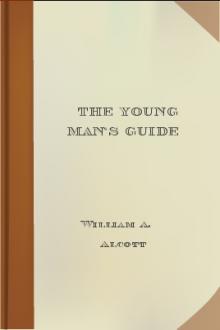The Young Man's Guide by William Andrus Alcott (reading strategies book .TXT) 📕

- Author: William Andrus Alcott
- Performer: -
Book online «The Young Man's Guide by William Andrus Alcott (reading strategies book .TXT) 📕». Author William Andrus Alcott
hionable education in fault. 6. Sobriety. Definition of the term. An anecdote. Love of mental and bodily excitement usually connected. 7. Industry. How to judge whether a person is industrious. 8. Early rising. A mark of industry. Late rising difficult of cure. 9. Frugality. Its importance shown. 10. Personal Neatness. Its comforts. 11. A good temper. Its importance illustrated. 12. Accomplishments. 263-305
CHAPTER VII.
--CRIMINAL BEHAVIOR.
Section I. Inconstancy and Seduction.--Constancy. Its importance illustrated by an example. Cruelty of sporting with the affections of a female. Opinion of Burgh. 306-313
Section II. Licentiousness.--Most common in cities. New Orleans. Hint to legislators. A horrid picture. Not wholly imaginary. Avoid the first erring step. Example of premature decrepitude. Anecdote of C. S. Solitary vice. This vice compared with intemp
Free e-book «The Young Man's Guide by William Andrus Alcott (reading strategies book .TXT) 📕» - read online now
Similar e-books:





Comments (0)